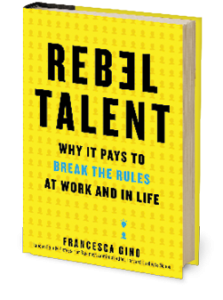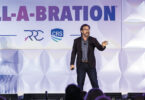Done correctly and in the right doses, rule-breaking doesn’t have to get us in trouble. Instead, it can help us get ahead.
By Allan Fallow
 In 15 years of studying how various enterprises are run well—or run into the ground—Harvard Business School professor Francesca Gino became an expert on scofflaws: people who tell fibs on dating websites, cheat on tax forms or exams, or treat red lights as mere suggestions. When caught in the act, these miscreants land in predictably hot water.
In 15 years of studying how various enterprises are run well—or run into the ground—Harvard Business School professor Francesca Gino became an expert on scofflaws: people who tell fibs on dating websites, cheat on tax forms or exams, or treat red lights as mere suggestions. When caught in the act, these miscreants land in predictably hot water.
But what about a more benign breed of transgressor: “People who are not afraid to break the rules when the rules are holding them back?”
Dubbing these individuals “‘deviants,’ but in a positive way,” Gino paints a pleasantly subversive group portrait of surgeons and CEOs, salespeople and pilots, filmmakers and fast-food workers who “question their own assumptions and strongest beliefs, as well as the widely accepted norms around them, to identify more creative, effective ways of doing transcendent work.” Her new book, subtitled Why It Pays to Break the Rules at Work and in Life, profiles these “rebel talents” in the earnest expectation that readers will “bring more joy into [their] lives” when they unleash their own revolutionary spirit.
“Strong habits pull us toward the familiar and comfortable,” Gino writes. “We need to learn to ‘break’ these habits, like so many Han dynasty urns.” (She’s referencing Chinese conceptual artist Ai Weiwei, who smashed a 2,000-year-old vase in a famous performance piece.) To stoke our own breakout behavior, Gino identifies and dissects what she calls “the five core elements of rebel talent.”
1. Novelty. Not every woman would consider enrolling her new husband in an improv comedy class, but that’s the Christmas present Gino gave her spouse, Greg, in 2011. It was a bold move—“being a bit of a tech geek,” she writes, “he was probably expecting some exciting new gadget”—but the author’s studies of employee disengagement had taught her that the human need for novelty runs surprisingly deep. Whether it’s the fast-food chain Pal’s Sudden Service in Tennessee and Virginia or a large retail operation in India, says Gino, variety acts as a motivator in even the most rote job.
The improv class hardly prepared the couple to headline Saturday Night Live, of course. But—sales pros, take note—it taught them why psychologists use the term “self-expansion” to describe such put-yourself-out-there experiences:
“When we engage in novel activities and acquire new skills, our sense of who we are expands. … This, in turn, heightens our confidence that we can accomplish our goals, even when we’re outside our comfort zone, and it increases our commitment to reaching our destination, no matter how tough the road.”
2. Curiosity. Rebels hold on to the curiosity that peaks in most people at 4 or 5 years old. They never stop obeying their inner impulse to ask “why?” This was the successful strategy of new BBC director-general Greg Dyke, for example, when he was brought in to revitalize the company in 2000: He met with staffers all over the UK, asking them two questions:
- “What is the one thing I should do to make things better for you?” and
- “What is the one thing I should do to make things better for our viewers and listeners?”
Like the best rebel leaders, Dyke understood that asking for advice increases how competent others perceive us to be. (Still not convinced? Consider this business-case statistic from an unrelated field: “Speed daters who ask more questions get more second dates.”)
3. Perspective. Everyone’s familiar with the tunnel vision created by extreme stress, which can pressure us to make poor decisions. Instead of taking a step back to weigh all our choices, we survey only the most obvious alternatives and lose sight of the bigger picture. Thank God rebel talent Captain Chesley Sullenberger had no such paucity of perspective when a flock of Canada geese crippled US Airways flight 1549 two minutes after it took off from LaGuardia Airport on Jan. 15, 2009. Out of engine power—and out of flight options—Sully looked at the Hudson River and thought, “Why not a landing strip?”
To emulate his brand of rebellious thinking, Gino suggests we ask not “What should I do?” but “What could I do?” in knotty situations. Performing such a pivot, she believes, can shift us from analyzing fixed options to considering (and then generating) more creative ones.
4. Diversity. Rebels understand that stereotypes blind us to the true nature of reality and block us from gaining an edge over rivals. After retracing the many hurdles that African American filmmaker Ava DuVernay had to vault in order to nab her first directing gig (A Wrinkle in Time), Gino details why gender and racial diversity make such robust business sense: Of 506 firms studied by sociologist Cedric Herring in 2009, those with greater diversity had higher sales revenue, more customers and richer profits.
5. Authenticity. Rebels are “willing to stand ‘naked’ in front of others,” Gino writes. What she means by that (I hope!) is that opening up wins us the trust of others, even when—perhaps especially when—it involves exposing our own vulnerabilities. “Revealing our deepest emotions takes courage,” the Rebel Talent author writes, “which inspires emulation and admiration in the people around us. Rebels understand this.”
Naturally, breaking the rules should never be done purely to stir the pot. But try sticking your neck out and observe how people respond. “I’ve tried it myself,” Gino testifies, “and it’s opened me up to a world of new experiences.”








